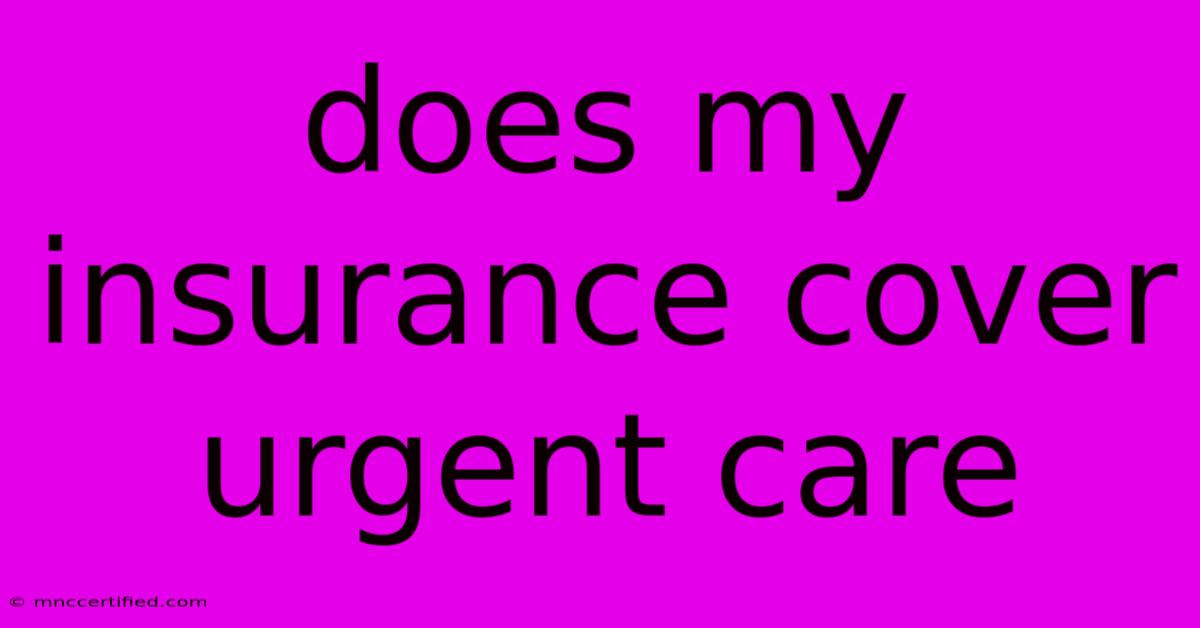Does My Insurance Cover Urgent Care

Table of Contents
Does My Insurance Cover Urgent Care? A Guide to Understanding Your Coverage
Urgent care clinics are a convenient and affordable option for non-life-threatening medical issues. However, understanding your insurance coverage for urgent care is crucial to avoid unexpected costs. This guide will help you decipher your insurance plan and determine if it covers urgent care visits.
What is Urgent Care?
Urgent care facilities provide immediate medical attention for non-life-threatening conditions that require prompt treatment. This could include:
- Minor injuries: Sprains, cuts, and burns
- Illnesses: Flu, ear infections, and strep throat
- Other issues: Allergies, skin rashes, and urinary tract infections
Urgent care is a great alternative to waiting for an appointment with your primary care physician or visiting an emergency room. They often have shorter wait times and lower costs compared to emergency room visits.
Understanding Your Insurance Coverage
The extent of your insurance coverage for urgent care depends on your specific plan. Here are some factors to consider:
- Plan Type: Some insurance plans explicitly cover urgent care visits, while others may require a referral from your primary care physician.
- Co-pays and Deductibles: You may have a co-pay or deductible for each urgent care visit. This means you'll pay a fixed amount for each visit, or a certain amount before insurance kicks in.
- Network Coverage: Ensure the urgent care facility you choose is within your insurance network. Out-of-network providers may have higher costs and limited coverage.
How to Find Your Coverage Information
The best way to confirm your coverage is to:
- Contact your insurance provider: Call their customer service line and inquire about urgent care coverage.
- Check your insurance card: Some insurance cards list the coverage for urgent care directly.
- Review your plan documents: Your policy documents will have detailed information about your benefits, including urgent care coverage.
Tips for Reducing Urgent Care Costs
- Check for discounts: Some urgent care facilities offer discounts for cash payments or certain types of services.
- Compare costs: Call different urgent care facilities in your area to compare their prices and coverage.
- Utilize telemedicine: Consider virtual visits with a medical professional through your insurance provider's telehealth platform, which can often be a more affordable option.
It's important to note: Always consult with your insurance provider for the most accurate information regarding your coverage and potential costs.
Conclusion
Understanding your insurance coverage for urgent care is essential for making informed healthcare decisions. By contacting your insurance provider, reviewing your plan documents, and comparing costs, you can ensure you have the information you need to receive the care you need without unexpected financial burdens.

Thank you for visiting our website wich cover about Does My Insurance Cover Urgent Care. We hope the information provided has been useful to you. Feel free to contact us if you have any questions or need further assistance. See you next time and dont miss to bookmark.
Featured Posts
-
X Migration To Bluesky Accelerates
Nov 13, 2024
-
Juventus Vs Arsenal Womens Ucl Match Report
Nov 13, 2024
-
American Alliance Insurance Near Me
Nov 13, 2024
-
Wrexham At Port Vale Match Preview And Team News
Nov 13, 2024
-
Pensioners Face Food Crisis Crisps As Aid
Nov 13, 2024